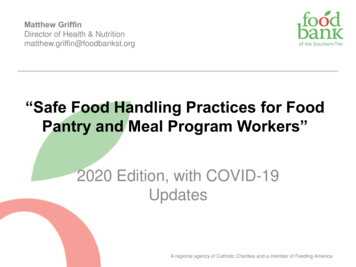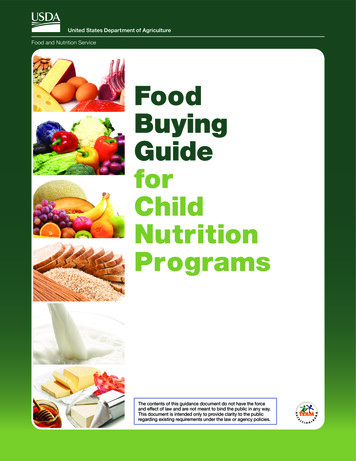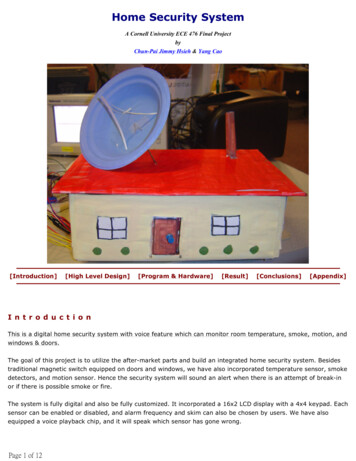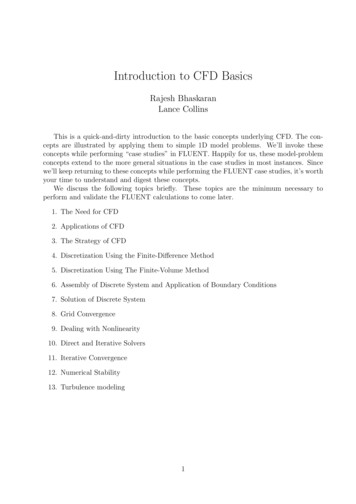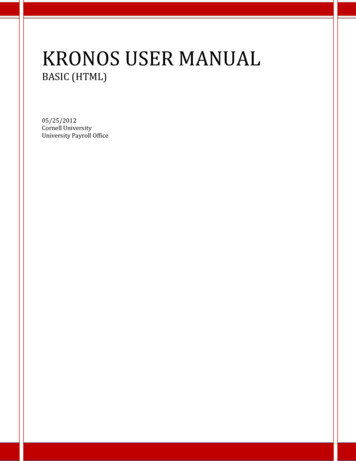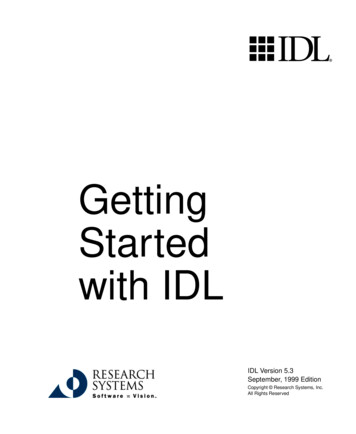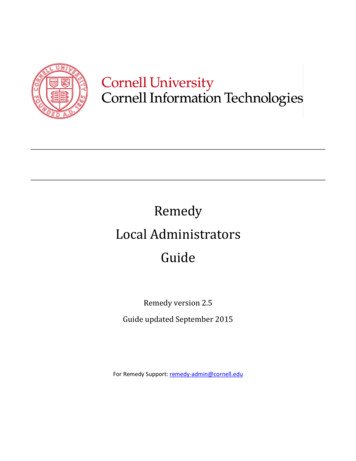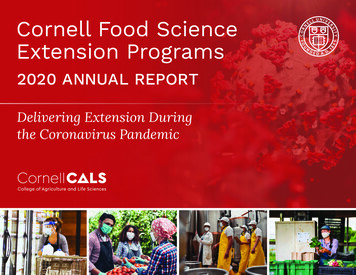
Transcription
Cornell Food ScienceExtension Programs2020 ANNUAL REPORTDelivering Extension Duringthe Coronavirus Pandemic
Cornell Food Science ExtensionPrograms Deliver During the Pandemic“There is no excellence without labor. One cannot dream oneselfinto either usefulness or happiness.” – Liberty Hyde BaileyOn March 23, 2020, within days of the initial COVID-19 shutdown in New York, the Institute for Food Safety at Cornell University (IFS@CU)hosted their first Food Industry Virtual Office Hours in collaboration with government and industry partners. These weekly Q&A sessionscontinued with over 40 sessions and 2,500 participants through the end of 2020. In the weeks and months that followed the initial shutdown,Cornell Food Science Extension team members continued to quickly respond to evolving needs, which included developing a webpage forsharing COVID-19 related resources; shifting in-person food industry short-courses and workshops to online formats; and developing newwebinars and videos on pandemic-related topics, ranging from safe reopening of craft beverage tasting rooms to bilingual safety training forfood processing environments.The breadth and scope of these new activities is remarkable, but their descriptions cannot capture the extraordinary labor and dedicationnecessary for their rapid implementation. We will remember this pandemic period for its challenges, but also for revealing our extensioncolleagues’ extraordinary capacity for excellence, no matter the circumstances. We hope you feel similarly as you read this annual report.Sincerely,Carmen I. MoraruProfessor and ChairDepartment of Food ScienceCornell UniversityCornell Food Science Extension ProgramsGavin SacksProfessor and Associate ChairDepartment of Food ScienceCornell University
Table of ContentsCornell Food Science Extension Programs Deliver During the Pandemic.2Institute for Food Safety at Cornell University (IFS@CU).4Cornell Institute for Food Systems Industry Partnership Program (CIFS-IPP).5National Good Agricultural Practices (GAPs).6Produce Safety Alliance (PSA).7Cornell Food Venture Center (CFVC).8CFVC Pilot Plant.9Dairy Foods Extension.10Cornell Dairy Plant.11Food Processing Development Lab (FPDL).12Cornell Craft Beverage Institute (CCBI).13Food Microbiology Lab.14High Pressure Processing Validation Center (HPP).15HACCP Training for Food Processors.16New York Sea Grant: Seafood Safety Training (NYSG).172020 ANNUAL REPORT Delivering Extension During the Coronavirus Pandemic1
Cornell Food Science ExtensionPrograms Deliver During the PandemicIn extension, our work is grounded on connecting with the industries we serve by delivering in-person training, workshops and consultations;providing lab-based and pilot plant services; and conducting applied field and product research. The COVID-19 pandemic forced us toreimagine how we would maintain connections with the people and industries we serve and continue to provide them with the information,services and research they have come to trust us to deliver. We also recognized that the industries we serve needed our support, more thanever, in responding to the pandemic. Here are some of the highlights of what our extension programs achieved in a year like no other.Providing COVID-19 Support and ResourcesCornell Food Science Extension Programs partnered with the New York State Department of Agriculture and Markets to create a COVID-19Rapid Response Task Force to lead a coordinated response to meet the needs of the food industry during the pandemic. Here are a fewexamples of how the task force provided COVID-19 support and resources.Launched and delivered a series called Food Industry Virtual Office Hours, a facilitated Q&A co-hosted by the Institute for Food Safetyat Cornell University (IFS@CU) and the New York Integrated Food Safety Center of Excellence to address questions from the food industryrelated to COVID-19. In 2020, they hosted a total of 40 sessions of virtual office hours with over 2,500 attendees.Developed general food industry resources including educational and training videos, infographics, guidance, checklists, and FAQs.The COVID-19 Rapid Response Task Force curated this content as well as other COVID-19 guidance and resources for the food industry andconsumers on the IFS@CU website, which received more than 107,000 visitors from March 2020 through the end of the year.Provided commodity-specific support. For example, the Cornell Craft Beverage Institute (CCBI) developed guidance and assisted distilleriesin converting their operations to make and distribute hand sanitizer, fulfilling a major gap in the supply chain at the onset of the pandemic.2 Cornell Food Science Extension Programs
The CCBI also hosted several webinars for the craft beverage industry on howto adapt their businesses to meet COVID-19 policies, including a webinar onReopening Craft Beverage Tasting Rooms, which had more than 300 attendees.Events Hosted/Delivered, 2020Responded to media requests to promote safe food practices. Interviews ofCornell Food Science Extension team members were featured in newspapers,magazines, radio, and televised local and internet news outlets. Notably,CNET produced the short video “Best practices for safe shopping, delivery andtakeout in the age of coronavirus,” which features Dr. Laura Acuna-Maldonadofrom the Produce Safety Alliance (PSA) and received over 138,000 views.389Delivering Online and Remote TrainingThe Cornell Food Venture Center (CFVC), CCBI, Dairy Foods Extension, PSA,and New York Sea Grant (NYSG) transitioned in-person training and workshopsto either self-pace online or remote instructor-led courses. Collectively, theextension programs offered 65 courses in 2020, reaching 3,425 attendees.Continuing Client-Based ServicesAll client-based services were temporarily suspended when the Universitymade the decision to have faculty and staff work remotely. However, providingservices to the food industry was deemed essential work and several programswere the first to return to campus during the pandemic. The CFVC, CFVC PilotPlant, CCBI, CIFS-IPP, Dairy Foods Extension, Food Microbiology Lab, FoodProcessing Development Lab (FPDL), and HPP Validation Center resumed theirwork and provided services to more than 1,050 businesses in 2020.Combined Accomplishments in 2020Despite the many challenges that presented themselves in 2020, the extensionprograms showed resilience and continued the work to connect with theindustries they serve. Collectively, they instructed or participated in 389 meetings,trainings, workshops, demonstrations and programs. In 2020, team extensionfaculty and professionals delivered over 72,579 hours of training, engaging morethan 23,914 stakeholders at these events.2020 ANNUAL REPORT Delivering Extension During the Coronavirus PandemicCCBI (22)CFVC (17)CIFS-IPP (1)Dairy Foods Ext. (28)Food Micro Lab (3)IFS@CU (55)National GAPs (19)NYSG (7)PSA (237)Hours of Training Delivered, ornell Craft Beverage InstituteCornell Food Venture CenterCornell Institute for Food SystemsDairy Foods ExtensionFood Microbiology LabInstitute for Food Safety at CUNational Good Agricultural PracticesNew York Sea GrantProduce Safety Alliance72,579Total Hours3
Institute for Food Safetyat Cornell University(IFS@CU)The Institute for Food Safety at Cornell University (IFS@CU) takes a comprehensive approach to providing training and conducting appliedresearch to support the food industry in reducing foodborne illness risks. With expertise in fresh produce, dairy, juice and food processing,the IFS@CU aids the food industry in complying with federal regulatory requirements in the Food Safety Modernization Act (FSMA) andaddresses food safety challenges that stretch from farms to consumers’ tables.In 2020, the IFS@CU not only continued to deliver food safety curricula through in-person workshops (hosted before the pandemic) and theGMPs Part 117 Online Course, but also directed a significant effort toward supporting the food industry both domestically and internationallyin response to the COVID-19 pandemic. The IFS@CU hosted the series Food Industry Virtual Office Hours to address questions on COVID-19in the US and mentored international colleagues in Bangladesh, Cambodia, Kenya, Nepal and Senegal to support the development ofmulti-lingual web-based resources and the launch of a Food Industry Virtual Office Hours series abroad.55 Events Hosted/Participated inGMPs Part 117 Online Course:3,397 Total Attendees/Viewers585 Participants11,891 Total Contact Hours8,424 Training Hours4 Cornell Food Science Extension Programs
Cornell Institute forFood Systems IndustryPartnership Program(CIFS-IPP)The Cornell Institute for Food Systems Industry Partnership Program (CIFS-IPP) is a public-private partnership that expands and enhancesthe engagement of Cornell University faculty, staff and students with industry scientists, engineers, and business leaders across complexglobal food systems. By combining expertise in scientific research, business economics and industry practice, CIFS-IPP has a long historyof finding solutions to today’s food systems challenges and shaping tomorrow’s discoveries.In many ways, 2020 highlighted the risks of food system disruptions and the critical need to put our science to work for the food industryto help ensure that people everywhere have access to nutritious, safe, and affordable food. CIFS-IPP continued to work virtually duringthe pandemic to advance industry practice with cutting-edge science to propel our food industry partners to the forefront of research,development, and technology.Some program accomplishments from the year include a record attendance at the CIFS-IPP Annual Symposium; implementation of newvirtual program content to help prepare students for industry careers and the challenges imposed by the pandemic; and continued growthof the program’s industry membership.CIFS Annual Symposium:15 Corporate Partners118 Total Attendees/Viewers2020 ANNUAL REPORT Delivering Extension During the Coronavirus Pandemic5
National GoodAgricultural Practices(GAPs)Implementing food safety practices to minimize microbial risks isimportant at all stages of production, including at planting.The National Good Agricultural Practices (GAPs) Program has helped to ensure the safety of fruits and vegetables since 1999, by workingwith growers and packers to reduce microbial risks during growing, packing, storage, and transportation. Through a comprehensiveeducation and extension program, National GAPs Program personnel facilitate the development of farm food safety plans to increaseunderstanding and implementation of GAPs, as well as how they align with FDA’s regulations under the Food Safety Modernization Act(FSMA) Produce Safety Rule and third-party audit requirements.Program personnel focus on in-person and online training to small and mid-sized farm and packing house owners, farm workers, beginningfarmers, socially-disadvantaged farmers, small processors, and small fresh fruit and vegetable wholesalers. In addition, National GAPsProgram personnel conduct needs-based research including evaluating microbial risks associated with soil amendments and water usedduring fresh produce production. Supporting growers, packers, and farm workers to effectively implement food safety practices helps tokeep safe and wholesome produce available for consumers and maintain farm economic viability.19 Events Hosted/Participated in5 Produce Safety Courses Offered:511 Total Attendees/Viewers85 Participants390 Total Contact Hours6 Cornell Food Science Extension Programs
Produce SafetyAlliance(PSA)A farm employee does his part to implement food safety practices bywashing his hands to ensure the safety of the crops he is harvesting.The Produce Safety Alliance (PSA) provides fundamental, science-based, on-farm food safety knowledge to fruit and vegetable growers,packers, educators, regulatory personnel, and others interested in the safety of fresh produce. Established in 2010, the PSA is a collaborationbetween Cornell University, FDA, and USDA to prepare produce growers to meet the regulatory requirements in the Food SafetyModernization Act (FSMA) Produce Safety Rule (PSR). The PSA team trains and mentors PSA Trainers and Lead Trainers to ensure highquality courses are available globally so that growers can comply with the FSMA PSR training requirement in § 112.22(c).In addition to its focus on effective training, the PSA team also provides technical assistance to growers and trainers. These efforts includethe development of English and Spanish novel educational materials, supplementary training information, and one-on-one bilingualconsultation. Helping the produce industry implement food safety practices protects consumers and ensures the economic viability offarms and rural communities. Recognizing that the produce industry is comprised of diverse growers from all over the world, the PSA teamcontinues to expand accessibility to information through additional translations of its training manual including Chinese and Portuguese,the development of illustrations for low literacy individuals, and the development of policies that allow trainings to be extended to growersthat are literate in languages not yet available through current translation efforts. Note: the data below represents training activitiesconducted by the PSA team, along with their national and international cadre of trainers, as a cumulative total since September 2016.2,741 Grower Training Courses Offered:101 Train-The-Trainer Courses Offered:62,532 Participants3,191 Participants598,208 Training Hours57,526 Training Hours2020 ANNUAL REPORT Delivering Extension During the Coronavirus Pandemic7
Cornell FoodVenture Center(CFVC)Cornell Food Venture Center (CFVC) provides comprehensive assistance to new and established food entrepreneurs, processors and farmersto enhance food safety, satisfy regulatory compliance and promote economic development. Services include scheduled process and processreview validation for processed foods, laboratory services and consultation for product safety and stability, reduced oxygen packaginghazard analysis and validation, heat penetration studies, food classification letters, and training. The CFVC Pilot Plant assists entrepreneurs,small business owners, and established food companies with product development and process scale-up efforts in a newly renovated facilitywith state-of-the-art technology and equipment.17 Events Hosted/Participated in558 Clients/Businesses Assisted2,422 Total Attendees/Viewers1,715 Samples Analyzed forSafety & Stability1,993 Total Contact Hours1,583 Scheduled Processes forValue-Added Food Products8 Cornell Food Science Extension Programs
CFVC Pilot PlantGeorge Howick, Pilot Plant Technician, operates theTurbo Extractor Pulper/Finisher.The Cornell Food Venture Center (CFVC) Pilot Plant is a newly renovated facility that has the perfect combination of established foodprocessing and preservation technologies with innovative equipment to promote the development and production of healthy, high qualityfoods. With a variety of equipment available, the CFVC Pilot Plant grants clientele the ability to make their final food product in the samelocation, from starting materials to the final packaged product. It also provides a unique setting allowing the comparison of differentequipment and technologies utilizing the same materials to address the final quality and stability (shelf-life) of the food produced and todetermine the best manufacturing process that meets the needs of each particular client. The CFVC Pilot Plant assists most clientele withresearch and development, scale-up trials, and start-up runs.17 External Clients/Businesses Assisted9 Internal Clients (Cornell University)2020 ANNUAL REPORT Delivering Extension During the Coronavirus Pandemic9
Dairy FoodsExtensionDairy Foods Extension provides food safety and food processing training to processorsboth large and small. Pictured to the right is James Munn of Black River Naturals.Dairy Foods Extension’s mission is to provide comprehensive training and consulting to the dairy industry to assist in the sustainablemanufacture of safe, quality dairy products. Courses provide training to dairy processors in vital topics including milk and dairy productquality and safety, basic dairy microbiology, GMPs, unit operations, sanitation, food safety plans, audits, and state and federal regulations.Our program offers an extensive set of live and virtual workshops that lead towards certificates in fluid milk production, cheese production,ice cream production, and production of yogurt and other cultured dairy products.In 2020, the Dairy Foods Extension team developed 13 new online courses and continued to offer 4 existing online courses. As a notableexample, they developed a fully online High Temperature Short Time (HTST) Pasteurizer course that has since been delivered 3 times toa total of 135 attendees.28 Events Hosted/Participated in20 Courses Offered:1,297 Total Attendees/Viewers787 Participants13,978 Total Contact Hours11,665 Training Hours10 Cornell Food Science Extension Programs
Cornell Dairy PlantHalf gallons of Cornell Dairy reduced-fat milk ready to be packed intocases and distributed to the Cornell community.The Cornell Dairy Plant is an IMS rated, New York State Department of Agriculture and Markets licensed, Kosher certified facility with4,760 sq. ft. of processing area and over 10,000 sq. ft. of climate controlled refrigerated and frozen storage. Capabilities include: fluidtransportation, raw and pasteurized fluid milk storage, a computer generated batching system, HTST pasteurization, a homogenizertwo-stage system, a cold-milk separator, a yogurt room (minimum batch size 50 gal.), ice cream production and packaging (minimumbatch size is 100 gal.), fluid packaging, and butter production and packaging (minimum batch size is 10 gal.).In addition to producing products for Cornell and other campuses, the plant is designed to support Dairy Foods Extension efforts byproviding a hands-on training facility to more than 200 industry professionals and students during an average year. Specific trainings thattake place in the Dairy Plant include Dairy Science and Sanitation, Fluid Milk Processing for Quality and Safety, HTST and Vat Pasteurizer.60,375 gal. of Milk Bottled16,245 gal. of Ice Cream Produced54,674 lb. of Yogurt Produced1,700 lb. of Butter Produced2020 ANNUAL REPORT Delivering Extension During the Coronavirus Pandemic11
Food ProcessingDevelopment Lab(FPDL)Artisan cheesemakers are separating curds and whey, and salting
The IFS@CU hosted the series Food Industry Virtual Office Hours to address questions on COVID-19 in the US and mentored international colleagues in Bangladesh, Cambodia, Kenya, Nepal and Senegal to support the development of multi-lingual web-based resources and the launch of a Food Indu

